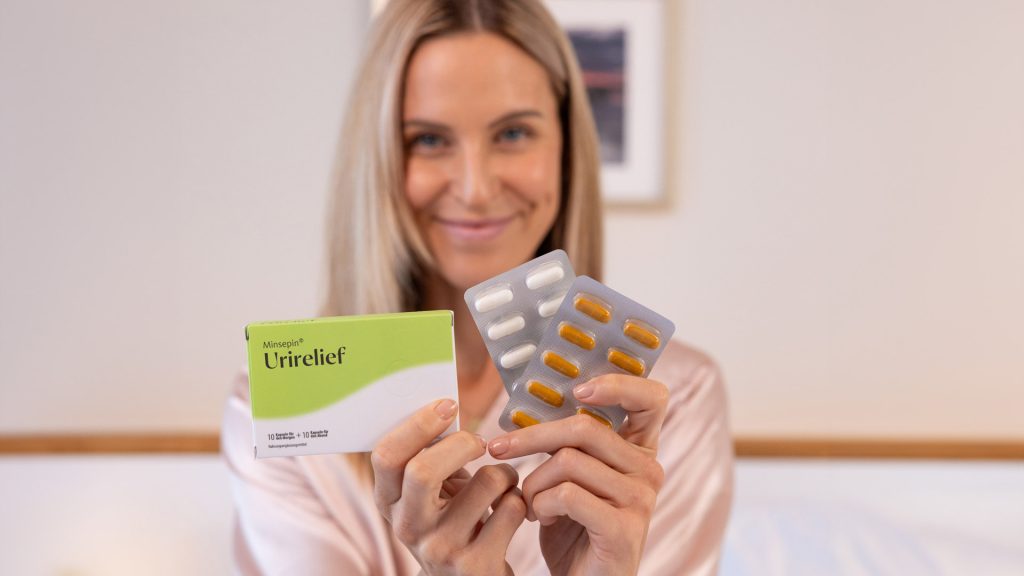Recurrent urinary infections: why they happen and how to break the cycle
- READING TIME 6 MIN
- PUBLISHED February 20, 2024
- AUTHOR Donna
Key takeaways
- Urinary tract infections (UTIs) are common, particularly in women+, who have a 30 times higher chance of contracting the infection than men+. Risk factors include reproductive age, postmenopausal changes and underlying health conditions.
- The root cause of most UTIs is the bacterium E. coli, responsible for up to 90 percent of infections. Frequent intercourse and bacterial persistence may lead to recurrent cases.
- Antibiotics, such as low-dose prophylaxis, can help break the vicious cycle of recurrent UTIs. Lifestyle changes, disciplined hygiene and dietary changes can also make a difference.
Recurrent urinary infections: why they happen and how to break the cycle
Urinary tract infections (UTIs) are one of the most common bacterial infections. Anyone can catch it, but women+ are especially vulnerable. Around 50–60 percent of them will experience a UTI during their lifetime.1
A vast majority of infections are caused by Escherichia coli, a bacterium residing in the intestinal system. When E. coli finds its way to the vagina, it can enter the urethra, infecting the bladder.2 Recurrent UTIs often result from reinfection by the same pathogen.
Bacterial persistence, where certain strains show resilience to conventional treatments, may sometimes also lead to persistent and recurring infections.3
Who is more at risk
Not everyone is at the same risk for recurrent urinary tract infections. Certain factors are important to consider here:
Gender: Women+ are more prone to recurrent UTIs compared to men+; in fact, they get them up to 30 times more often. The anatomical differences in the female+ urinary tract, such as a shorter urethra, proximity to the anus and hormonal changes, particularly during pregnancy and in menopause, all contribute to the higher risk.4 That said, men+ with an enlarged prostate may sometimes also be at higher risk.5
Age plays an important role too. Women+ in their reproductive years, for example, tend to be susceptible to contracting UTIs. Postmenopausal women+ may also face an increased risk because of hormonal changes affecting the urinary tract’s protective mechanisms.6
Pre-existing health conditions: Conditions such as diabetes, urinary tract abnormalities and immune system disorders can compromise the body’s ability to fend off bacterial infections, increasing the likelihood of recurrent episodes. Kidney stones or obstructions may also impede the normal flow of urine, providing reservoirs for bacterial colonization and increasing the risk of recurrent infections.7, 8
Sexual activity: Having frequent or vigorous sex can introduce bacteria into the urethra, increasing the chance of infection. Again, women+ are more at risk, which highlights the importance of post-sex hygiene.9

Breaking the cycle: learn about the preventive strategies
Understanding and implementing preventive strategies can make a huge difference in breaking the cycle of urinary tract infections. Let’s look at a couple of effective ways you could maintain a healthy urinary system and possibly prevent further infections.
A healthy diet, proper hydration and supplements. Dietary choices have considerable influence on preventing recurrent UTIs. Pears, bananas, winter squash, green beans, potatoes, whole grains like rice and quinoa, lean proteins such as fish, nuts like cashews and peanuts, eggs, and pomegranates, rich in vitamin C and antioxidants, are all excellent choices for a balanced diet.10
Hydration is equally critical for maintaining urinary health. Make sure to drink enough water because it facilitates different physiological processes, including the elimination of waste products through urine. Proper hydration also helps balance electrolytes, supports kidney function and prevents issues such as kidney stones by promoting optimal fluid flow and waste removal.11
To make sure your urinary health truly remains in tip-top condition, consider Donna’s specially formulated supplement. MINSEPIN URIRELIEF includes a combination of D-mannose, common heather, silver birch and berberine. All these substances include properties that support your urinary health and may offer relief from discomfort caused by uncomplicated UTIs. Jump over to our dedicated page to find out more.

Lifestyle changes. There is a significant connection between regular exercise, stress management and adequate sleep in supporting immune function and, by extension, urinary health.12, 13 Simple yet impactful adjustments in daily life, like working out and meditating, can pave the way for a healthier, more resilient you.
Hygiene practices. Thorough hygiene practices are vital in UTI prevention. Avoid douching, as it strips away vaginal flora and creates an ideal environment for bacterial infection.14 Showers are better than baths because they prevent soap residue finding their way into your vagina and disturbing the pH balance. It’s better to shower with mild, unscented soaps, as scented products can irritate vaginal tissues. Wear breathable cotton underwear, especially loose-fitting bottoms, to prevent moisture buildup and reduce the risk of infection.
When is it time to call the doctor?
It’s best to see a doctor as soon as you notice a burning sensation during urination, frequent urges to urinate or cloudy urine. Early medical intervention can prevent the infection from worsening and spreading to the kidneys, which can lead to more serious health issues.
The most common medical treatment is antibiotics. But not all are made the same.15

Low-dose continuous antibiotic or prophylaxis involves a small continuous dose of antibiotics over several months to eradicate bacteria, treating reservoirs hiding inside the bladder wall cells.
Post-coital antibiotic prophylaxis, designed for women+ with UTIs triggered by penetrative sex, includes a single low dose of antibiotics immediately after intercourse.
“Self-start” antibiotic courses, on the other hand, require obtaining a urine sample before starting a short course of prescribed oral antibiotics. Antibiotics can be taken immediately after you notice symptoms. Adjust the dose based on urine results after about 48 hours.
Postmenopausal women can also find relief through vaginal estrogen therapy, restoring the urogenital tract’s bacterial balance and reinforcing urinary system protection. This should minimise the risk of recurrent infections.16
Additionally, immunotherapy shows promising signs for treating recurrent UTIs by stimulating the immune system’s combat capabilities against urinary tract pathogens.17
Towards a healthier life
Learning what’s behind recurrent UTIs can allow you to proactively break the cycle. Making friendly adjustments to your lifestyle, hygiene practices and diet can boost your urinary health. If you combine these with medicine and therapies when needed, you get yourself a holistic approach that can lead to a more resilient urinary system and a healthier life.
REFERENCES
- https://www.ncbi.nlm.nih.gov/pmc/articles/PMC3749018/
- https://www.kidney.org/sites/default/files/uti.pdf
- https://www.ncbi.nlm.nih.gov/pmc/articles/PMC8497731/
- https://www.womenshealth.gov/a-z-topics/urinary-tract-infections
- https://www.nhsinform.scot/illnesses-and-conditions/kidneys-bladder-and-prostate/benign-prostate-enlargement/
- https://pubmed.ncbi.nlm.nih.gov/28364867/
- https://www.nationwidechildrens.org/family-resources-education/700childrens/2022/11/why-patients-with-diabetes-have-more-utis
- https://www.msdmanuals.com/home/kidney-and-urinary-tract-disorders/obstruction-of-the-urinary-tract/urinary-tract-obstruction
- https://www.everydayhealth.com/urinary-tract-infections/the-link-between-utis-and-sex.aspx
- https://www.cxbladder.com/us/blog/a-guide-to-keeping-your-bladder-healthy/#Foods
- https://www.cxbladder.com/us/blog/why-water-is-essential-for-bladder-health/
- https://www.sleepfoundation.org/physical-health/how-sleep-affects-immunity
- https://www.ncbi.nlm.nih.gov/pmc/articles/PMC6878733/
- https://www.verywellhealth.com/urinary-tract-infections-prevention-3520513
- https://www.urineincontinence.com.au/urinary-tract-infection/use-antibiotics-prevent-recurrent-urinary-tract-infection-uti
- https://www.ncbi.nlm.nih.gov/pmc/articles/PMC8058921/
- https://www.nature.com/articles/s41585-022-00602-4
RELATED ARTICLES
Explore more
Feed your curiosity with more content. Dive deeper and explore our selected articles, curated just for you.



